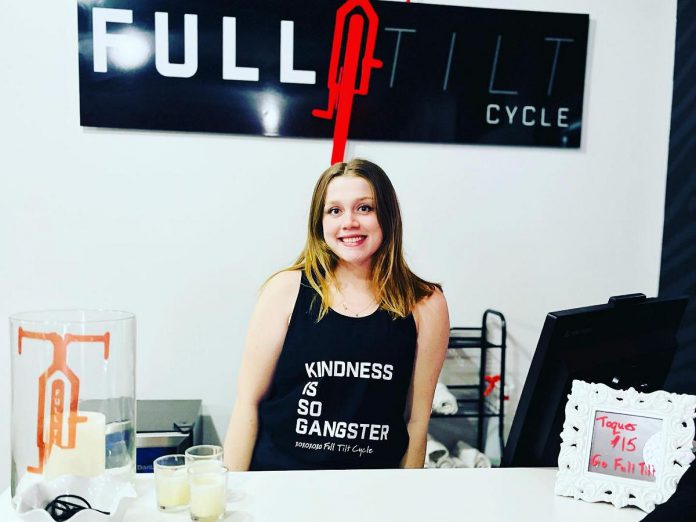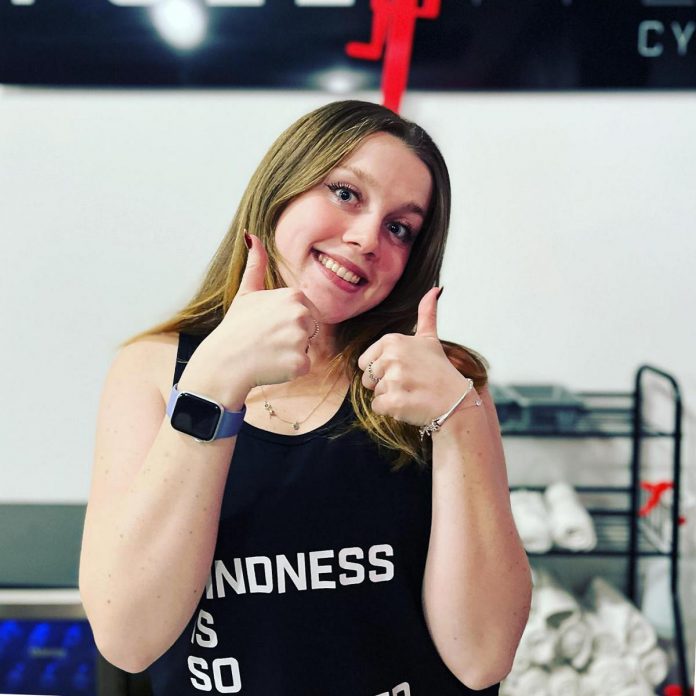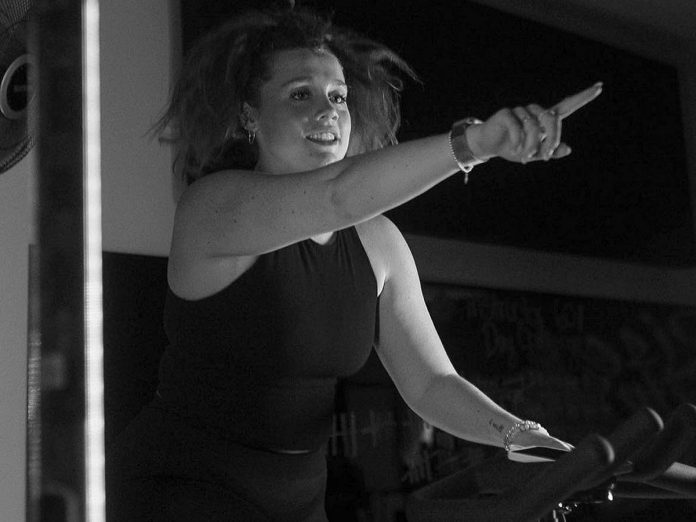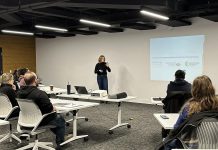
When she was 19 years old and all her friends were enjoying their summer holidays, Lakefield resident Rachel Jenkins was being told by three different neurologists she might never walk again.
Three years and a multiple sclerosis diagnosis later, not only is Jenkins walking, but she’s made it her career to help people improve their own mobility.
Today, Jenkins is a personal trainer for Lakefield 24 Hour Fitness and Young’s Point 24 Hour Fitness. Though she does all kinds of training, her niche is assisting her elderly clients with day-to-day functions that help them stay in their own home, like shoulder exercises for carrying groceries and squats for getting in and out of bed.
When she’s not working as a personal trainer, Jenkins is also a spin cycle instructor at Peterborough’s Full Tilt Cycle, a boutique cycling studio and fitness gym. She also works for Community Care Peterborough, a non-profit organization serving seniors and adults with physical challenges in the city and county of Peterborough.
“[Community Care] has a program where you can go into retirement homes and teach fall prevention and seated exercise,” she explains. “I’m able to relate to my clients, especially the ones that have trouble with mobility or independence, because I was there once.”
Before being diagnosed with multiple sclerosis, a potentially disabling disease of the central nervous system, Jenkins wasn’t planning on a life committed to working with her body. In June 2020, when she first felt the symptoms — a tingling in her feet not unlike when an arm or leg falls asleep — she was on summer break from studying political science at the University of Guelph. Her plan was to complete her degree and then head off to law school.
All of that changed when, not long after the first onset of symptoms, she woke up completely immobile, paralyzed from the waist down. She visited three neurologists who were unable to diagnose her, though they all told her she might never walk again.
“I never wanted to accept the wheelchair,” Jenkins says, explaining she spent the entire time before receiving her diagnosis in denial, unwilling to believe the symptoms were anything serious. “I’d never accepted that answer. And I think that’s good because obviously I proved them wrong.”
It took nearly a year before Jenkins was finally diagnosed with relapsing-remitting multiple sclerosis (RRMS). Relapsing-remitting means Jenkins gets acute attacks between long periods of less severe or even non-existent symptoms.

Although RRMS is the most common type of MS in Canada (around 85 per cent of those with MS are diagnosed with RRMS according to MS Canada), Jenkins’ case was difficult to diagnose because she had no prior family history of MS, she was very young when her symptoms began, and the onset was very sudden rather than progressive.
Between the first hospital visit and the diagnosis months later, Jenkins dropped out of school, moved back home to Lakefield, missed every major holiday with her family, and spent over two months at Lyndhurst Centre, a spinal rehabilitation facility in Toronto.
After months of intense and painful rehabilitation beginning with seemingly simple fine motor movements like uncurling and wiggling her toes, Jenkins slowly began to walk again.
“Even just trying to get up from my bed was very difficult,” Jenkins recalls. “It was scary because I didn’t trust my body.”
After working with her team of personal trainers and therapists, Jenkins saw a future that no longer involved law school. When she was out of the hospital and had her official diagnosis, she began to study fitness and health promotion at Fleming College.
During this time, she spent all of her free time at the gym and driving to Toronto three times a week to a physical therapist who specialized in spinal cord and brain injury.
“While all my friends were at work, I was focusing on physical therapy,” she says, adding that she gave herself small goals like being able to go to the mall with friends and walk down to her cottage dock without needing to be carried. “Recovery became my job.”
Dan Caldwell, the owner of the 24-Hour Fitness gyms in Lakefield and Young’s Point, was very impressed with Jenkins’ motivation and commitment to her fitness routine after months of seeing her come into his gyms. When she mentioned she was working towards becoming a personal trainer, he offered her a job on the spot, and she ended up getting her certification before finishing school.

She began working for Caldwell in October last year, about two years into her recovery and a year and a half after her diagnosis. Jenkins says much of what she’s learned comes from working for Caldwell, who she calls an “amazing mentor.”
“[He’s done personal training] for 40 years, so he was an awesome person to get into the business with,” she explains, adding that he’ll often give her tips when she’s having difficulty with a client. “I love working with him. He’ll just teach me everything.”
To learn a new approach to fitness, Jenkins chose to do her school placement with Full Tilt Cycle. Even though she’s now done her schooling, she continues to work as a spin instructor for the gym and says she enjoys having a career that combines various approaches to fitness.
“I love doing the personal training and the group fitness. It’s awesome to have a mix of both because I like the energy and the vibes that people give you in group fitness. Everyone is really supportive of each other and very motivating. Everyone’s there cheering each other on.”
On the day-to-day, Jenkins says she’s reached a point where she’s able to live a relatively close to normal life as long as she sticks to her fitness routine and continues to take her medication.
“I would say that if you looked at me, you wouldn’t know I have MS,” she points out.
Looking back, Jenkins remembers being in the hospital and telling her roommates how much she loved her life and didn’t want it to change. Now she knows that, without her diagnosis, she wouldn’t have been as happy as she is today.
“My whole body feels new,” she explains. “I really got a whole new life out of it, professionally and even with some friendships and where I live. Yes, I would have been fine had I ended up in law school. But I think I make more of an impact now — hopefully — on my clients and the people around me.”

Even aside from her professional endeavours, Jenkins feels her diagnosis has allowed her to grow as as a person and to become more empathetic towards others living with illness and disability.
“Until I was put in a situation where I had to use a wheelchair, I didn’t realize how inaccessible a lot of things are and now I notice it,” she says. “It also just made me more grateful. I definitely have a greater respect for my body and I have a greater respect for all the people around me.”
Jenkins recently told her story on CBC’s Sickboy, a humorous podcast on which three friends break down stigmas associated with illness and disease by hearing from those who have experienced it first-hand. Her episode, titled “Youthful Swagger and MS: Rachel’s Courage In The Face Of Early Onset Multiple Sclerosis,” is available on CBC Podcasts.


























